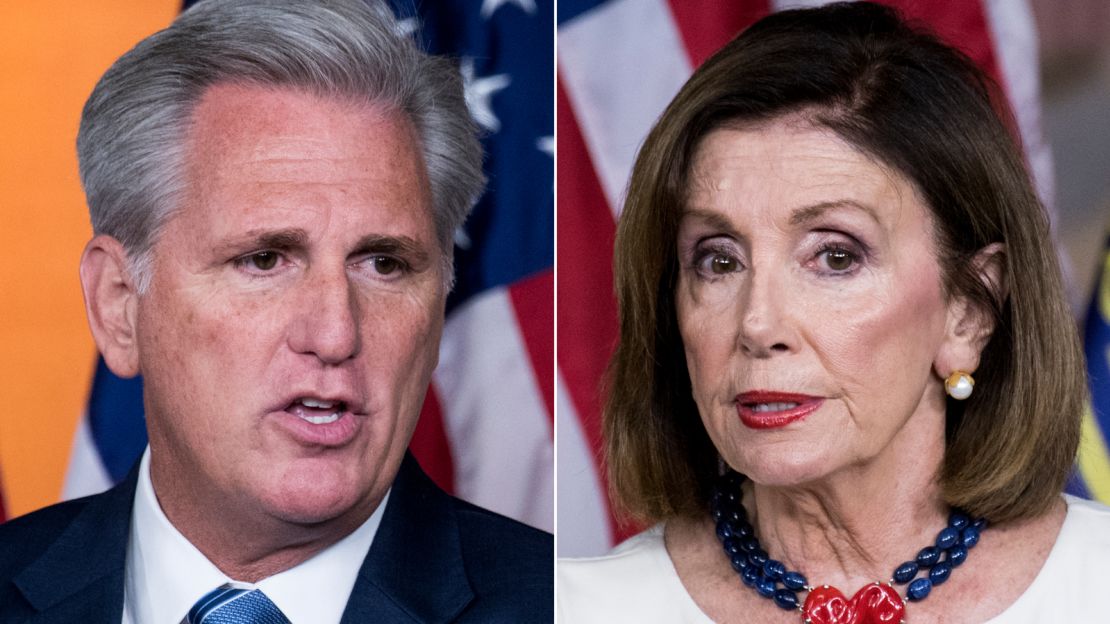House Minority Leader Kevin McCarthy asked House Speaker Nancy Pelosi to suspend Democrats’ impeachment inquiry into President Donald Trump in a letter on Thursday morning, calling for her seek the full House’s approval to launch the inquiry and establish rules and procedures for the probe.
“Unfortunately, you have given no clear indication as to how your impeachment inquiry will proceed — including whether key historical precedents or basic standards of due process will be observed,” McCarthy wrote. “In addition, the swiftness and recklessness with which you have proceeded has already resulted in committee chairs attempting to limit minority participation in scheduled interviews, calling into question the integrity of such an inquiry.”
McCarthy, a California Republican, asked Pelosi 10 questions about how the inquiry will be conducted, including whether Republicans will have equal subpoena power on the investigative committees, and if the President’s counsel will be able to attend hearings, present evidence, and cross-examine witnesses.
Republicans have urged Pelosi to hold a full vote in the House since she publicly announced her support for a formal impeachment inquiry September 24.
The full House voted to authorize impeachment inquiries for Presidents Richard Nixon and Bill Clinton. But Democrats say there’s nothing in the rules or the Constitution requiring such a vote, and the current House rules give the committees the tools they need already to conduct an inquiry, like subpoena power.
Pelosi reiterated those points in a letter responding to McCarthy on Thursday afternoon. She also said she hopes McCarthy and other GOP members “share our commitment to following the facts, upholding the Constitution, protecting our national security, and defending the integrity of our elections at such a serious moment in our nation’s history.”
“As you know, our Founders were specifically intent on ensuring that foreign entities did not undermine the integrity of our elections,” Pelosi wrote. “I received your letter this morning shortly after the world witnessed President Trump on national television asking yet another foreign power to interfere in the upcoming 2020 elections.”
Democrats on six key committees have been investigating Trump for months, but only in the past couple of weeks have leaders – including Pelosi – labeled the effort an official impeachment inquiry.
House Judiciary Committee Chairman Jerry Nadler, a New York Democrat, said over the summer that his panel’s investigation was an impeachment inquiry. Yet Pelosi and other Democratic leaders were reluctant to explicitly link the probe to impeachment until recently, after reports surfaced concerning an intelligence community whistleblower complaint that alleges Trump asked the president of Ukraine to seek dirt on Joe Biden in July, at the same time Trump was withholding millions of dollars in military aid to Ukraine.
Pelosi has tapped the House Intelligence Committee to lead the investigation into the whistleblower complaint’s allegations, and she has said the Ukraine matter is the central focus of the impeachment inquiry. Procedurally, Democrats expect the Intelligence Committee will lead the probe, but the House Judiciary Committee will vote on potential articles of impeachment before the full House considers them.

McCarthy’s comments follow Rep. Doug Collins, the top Republican on the House Judiciary Committee, telling a federal judge that the Democrats’ impeachment investigation has no legal basis.
In a proposed amicus brief filed Thursday with a federal judge in Washington, Collins said the court should reject a request by the Democratic-led committee to see information from the secret grand jury used in former special counsel Robert Mueller’s investigation.
Collins reiterated the GOP’s argument that the full House must vote to authorize an impeachment inquiry, and it has not done so.
“If the Committee seeks judicial interference in its proceedings, the House must take the procedural and political action required of it by holding a vote to delegate its impeachment power to the Committee,” Collins wrote. “Barring such action, the Committee advances an unprecedented and untested audience.”
Asked if the House should vote on the inquiry in an interview with ABC that aired Thursday morning, Pelosi said Democrats “feel that we’re on very firm ground as we go forward” and that a vote is not needed.
But she also left open the possibility.
“We haven’t, but we could,” she said of holding a full House vote, adding that she might do so “just because it’s a Republican talking point.”
If members did have to go on record about it, a CNN tally shows that at least 223 Democrats, along with independent Rep. Justin Amash, support opening an inquiry — above the 218-vote threshold needed for it to pass.
CNN’s Dan Berman contributed to this report.






